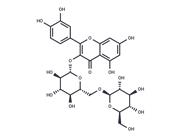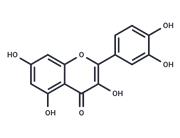| Name | Quercetin Dihydrate |
| Description | Quercetin Dihydrate (Sophoretin) is a polyphenolic flavonoid that was found in a wide variety of plant-based foods, such as apples, onions, berries, and red wine. It is used for their nervous system and anticancer effects. |
| In vitro | Quercetin, a polyphenolic flavonoid found in a wide variety of plant-based foods, such as apples, onions, berries, and red wine, is utilized in many different cultures for their nervous system and anticancer effects. The pharmacological activities of quercetin that modulate antioxidation/oxidation/kinase-signaling pathways might be differentially elicited in neurons compared with malignant cells, ultimately promoting cell survival or death in a cell type- and metabolism-specific manner. Whereas the broad antioxidation and anti-inflammatory activities of quercetin are important for neuronal survival, the oxidative, kinase- and cell cycle-inhibitory, apoptosis-inducing effects of quercetin are essential for its anticancer effects. [1] |
| In vivo | LD50: Mice 159 mg/kg (i.g.) [2] |
| Storage | Powder: -20°C for 3 years | In solvent: -80°C for 1 year | Shipping with blue ice/Shipping at ambient temperature. |
| Solubility Information | H2O : < 1 mg/mL (insoluble or slightly soluble)
10% DMSO+40% PEG300+5% Tween 80+45% Saline : 2 mg/mL (5.91 mM), Sonication is recommended.
Ethanol : 15 mg/mL (44.34 mM), Sonication is recommended.
DMSO : 45 mg/mL (133.03 mM), Sonication is recommended.
|
| Keywords | Quercetin Dihydrate | Quercetin | PI3K | Phosphoinositide 3-kinase | Inhibitor | inhibit | Apoptosis |
| Inhibitors Related | Stavudine | Aceglutamide | Urea | Cysteamine hydrochloride | Sodium 4-phenylbutyrate | Hyaluronic acid | Metronidazole | Citric Acid Triammonium | L-Methionine | Dimethyl phthalate | Alginic acid | Dextran sulfate sodium salt (MW 5000) |
| Related Compound Libraries | Polyphenolic Natural Product Library | Traditional Chinese Medicine Monomer Library | HIF-1 Signaling Pathway Compound Library | Anti-COVID-19 Traditional Chinese Medicine Compound Library | Anti-Obesity Compound Library | Anti-Cancer Metabolism Compound Library | Chinese Pharmacopoeia Natural Product Library | Anti-Inflammatory Traditional Chinese Medicine Compound Library | RO5 Drug-like Natural Product Library | Anti-Aging Compound Library | Food as Medicine Compound Library | Oxidation-Reduction Compound Library |

 United States
United States






